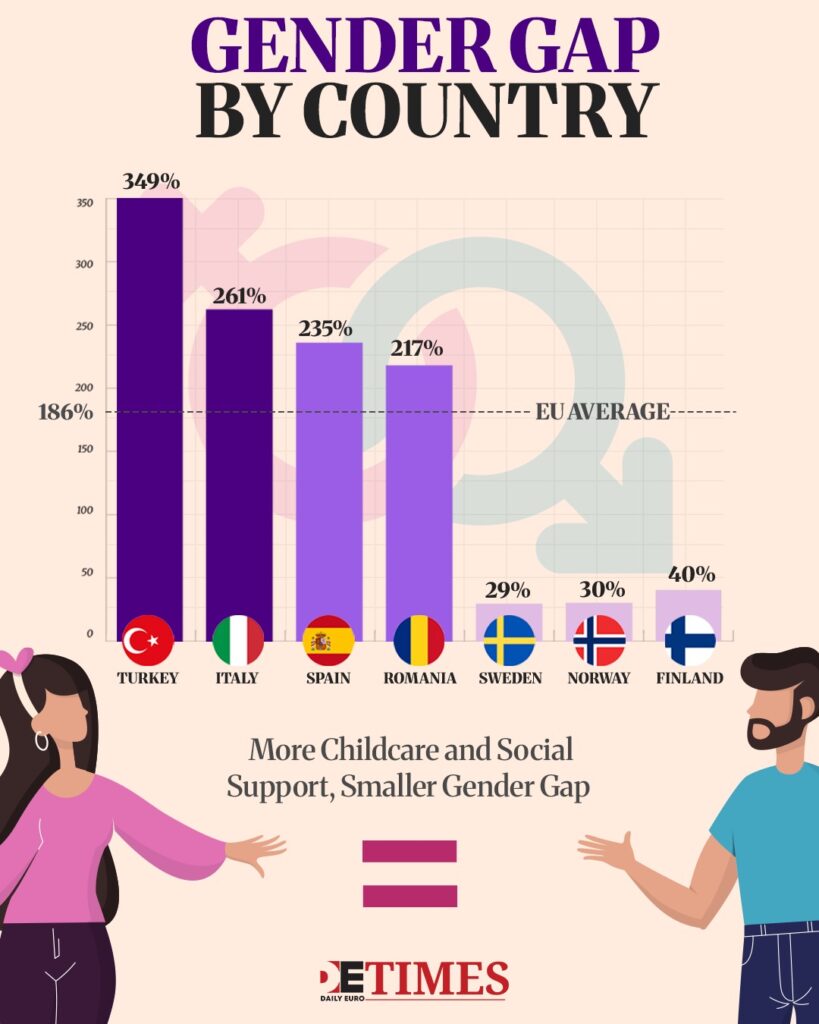Unpaid work is a significant aspect of gender inequality in Europe. Women spend, on average, two hours more per day on unpaid work than men. The gap between men and women, per day, ranges from 29% in Sweden to 349% in Turkey.
Across 23 European countries, women spend an average of 262 minutes per day on unpaid work, compared to 141 minutes for men.
Gender Gap by Country
The largest gap is observed in Türkiye, where women perform 349% more unpaid work than men.
In Italy, this figure is 261%, in Spain 235%, and in Romania 217%. In these countries, traditional gender roles and limited access to childcare contribute to high levels of unpaid work among women.
In Nordic countries such as Sweden, Norway, and Finland, the gap is significantly smaller. In Sweden, women perform 29% more unpaid work than men, the lowest rate among the 23 countries. These countries are characterized by highly developed social support systems and a more equal distribution of household responsibilities between the sexes.
Causes and Consequences
The main causes of the gender gap in unpaid work are social norms, stereotypes, and inadequate access to childcare.
Women are more likely to take on the care of children and elderly relatives, which limits their ability to participate in paid work.
This gap has long-term consequences for women, including limited career opportunities, lower pensions, and an increased risk of poverty in old age. Furthermore, high levels of unpaid work reduce overall well-being and social justice.

Solutions
To reduce the gender gap in unpaid work, it is necessary to implement policies aimed at improving access to childcare, promoting equality in the sharing of household responsibilities, and supporting flexible forms of employment.
Furthermore, it is important to change societal stereotypes and encourage men’s participation in unpaid work. Reducing the gender gap in unpaid work contributes to improving women’s economic status, increasing their labor force participation, and strengthening social justice in Europe.
Global Perspective: Digitalisation as a Solution
Unpaid work remains a significant barrier for women worldwide.
In North America, South (-East) Asia, and the Middle East, women continue to bear the brunt of childcare and household chores, limiting their opportunities for professional fulfillment.
In Asia and the Pacific, women disproportionately perform unpaid care and domestic work, which impacts their participation in the labour force and subsequently their access to educational and economic opportunities.
Digitalisation can play a key role in closing the gender gap. Research shows that digital financial inclusion helps reduce the gender pay gap by providing women with access to finance and improving their bargaining power.
However, women in developing countries face limited access to these technologies despite the potential of digital technologies.
The gender gap in unpaid work remains a serious problem in Europe and globally. It limits women’s economic opportunities and exacerbates social inequality.
Policy, support for the equal sharing of household responsibilities, and digitalisation can significantly reduce this gap, increasing women’s participation in the labor force and strengthening social justice.
Read the Latest Articles on DET!
Airbus’ Edge on Boeing is Innovation, Not Government Support
America First? TikTok Gives Control to Israeli Tech Company
Oktoberfest: A Festival Without the Fest-ivities





